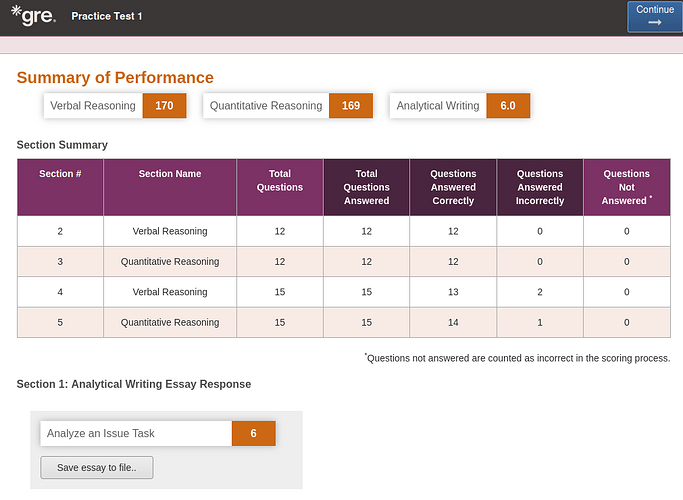@Leaderboard
Ugh. 169v 166q.
Over the last few weeks every marker in practice has consistently improved. Down from ~31 to ~21 minutes on Big Book and up from 28s to to 30s. Perfect scores on PP1 and PP2. 169 on your first mock test, which should have been a warning sign I didn’t have a cushion.
I did daily drills of the problems with formulas to make those automatic: quadratics, combinatorics, sum of multiples, finding harmonic means in work rate problems. Mental math improved by sheer repetition, prime factorization of common 3 digit numbers got automatic, etc. Started to anticipate where I’d make mental math errors and how I’d misread questions, errors went down, scores climbed, speed improved.
Got much more comfortable skipping questions, skipping a couple per section just to clear my mind and come back with a fresh approach. Fully cured me from spending 10 minutes on a question mid-test for no reason.
TEST DAY: Everything honestly felt really smooth. First half I feel like I found conceptual shortcuts all over the place and burned through it. I reviewed every single question, trying a different approach where I could. Solid. Could I have misread something? Obviously possible but would have bet money against it, I reread everything looking for common traps.
Second half was tougher, but I never felt overwhelmed. I marked anything where I even had a bad feeling. >3 calculations? Marked. I only had time to review my marked questions, but still didn’t feel worried.
At the end I was so shocked to see my score drop. Stings a lot.
In early practice tests, I had a really good feel for which ones I might have missed. Here I am pretty sure about one question, I debated two different interpretations and a little salty about ETS’s wording, but other than that I’m at a loss. I could have flipped A and B somewhere and missed it in review, maybe missed a case that would move to a D, I honestly don’t know.
I picked an arbitrary date first and stuck to it. Had it to do over again, I really wish I used all your mock tests and got to somewhere in the overkill zone and not rushed back in before that. I was still making gains in consistency and time.
By sheer coincidence I’m reading Moby Dick right now and I feel like the universe is trying to tell me something.
Thanks for being a sounding board, it really helps let off some steam.
For anybody who finds themselves in my shoes when I originally posted:
-
If you’ve done fundamentals, blitzing mock tests will improve your markers. You put that off at first to do your fundamentals, that’s good, but eventually you do want to do 1000 questions, you will improve your speed and catch common errors by doing that, if you track your mistakes.
-
Set a target for performance on mocks not a target date.
-
Luck is apparently a very real thing, everybody has bad days.
